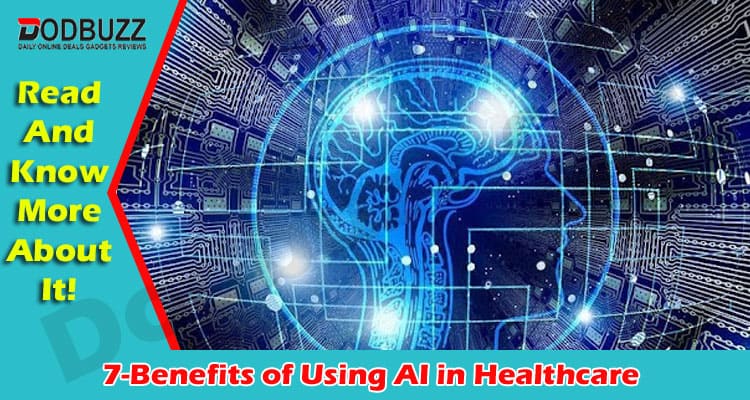AI in Healthcare: In the healthcare industry, artificial intelligence (AI) has emerged as the most powerful agent for change. AI delivers impactful, efficient, and precise clinical interventions, ranging from diagnosis and risk assessment to selecting treatment options. AI systems can perform many of the tasks previously performed by humans, while also reducing costs and time it takes to perform them.
Let’s find out about the many benefits of using AI in healthcare in the following sections.
Performing surgeries
Surgical robotics is among the most inventive AI use cases in healthcare. These AI-powered surgical robots are computer-operated devices that assist in handling surgical tools and make adjustment tweaks so that the doctors can focus on the difficult aspects of surgery. AI surgical systems can execute even the slightest movements with flawless precision.
Optimizing performance and efficiency
Modern healthcare practices are intricately entangled, leading to resource wastage and process duplication. By streamlining operations and processes in the healthcare setting, AI offers cost optimization, maximization of asset usage, and cutting back on patient waiting times.
AI is rapidly being adopted by healthcare providers to filter and scrape through massive amounts of data, which is gathered on their digital platforms, in order to produce insights that might help them improve operations, increase efficiency, and optimise performance.
Handling AI systems effectively for data scraping and gathering requires trained AI professionals, ideally with a masters healthcare informatics program degree, which is going to ensure that the data in your systems is well-utilized for further optimization of processes.
-
Avoiding fraud
The US Justice Department obtained more $2 billion in recovered fake claim settlements in the US. Investigating these fraudulent claims is a time consuming and cost-intensive endeavor, however, AI can cut back on investigation times and costs by assessing claims and tracking payment routes. Use of AI in verifying claims will not only reduce need for costly investigation hunts but also expedite payment process to deserving claimants. Artificial intelligence-based fraud detection can review and flag fraudulent claims before they are paid, which saves money and helps catch fraudsters in the act.
-
Minimising prescription errors
Prescription errors lead to nearly 9,000 deaths annually in the US alone. Millions of patients who exhibit adverse reactions or side effects to certain medicines, are not all reported officially.
Faulty employee health records or EHRs cause most of these cases. The EHRs were developed to reduce time and cost in patient care, but even minor errors in its interface and design can lead to tragic consequences. Diagnostic and prescription-related errors can be eliminated with the help of AI.
EHR data is examined and new prescriptions are compared using machine-learning models. Doctors can then review and make adjustments when errors in prescription are prompted, leading to reduced chances of making clinical errors.
-
Making health predictions
AI-driven systems are increasingly using patient data to analyse their past and current health issues. By comparing symptoms, medical professionals might arrive at more precise diagnoses. By compiling and learning from millions of symptoms and diagnoses fed into its databases, AI can accurately predict health problems before they’ve had a chance to take hold.
-
Promoting healthcare facilities
Countries in the developing world are behind those in the developed world when it comes to using contemporary medical technologies that can help citizens. In addition, the provision of healthcare is hampered due to a scarcity of trained healthcare professionals in these regions. In order to improve the efficiency of the healthcare system, AI can help create a digital infrastructure that facilitates faster diagnosis and triaging of patients.
In healthcare, AI can assist in alleviating medical troubles in rural areas that can arise from a shortage in medical staff. Diagnostic imaging tests including MRIs, X-rays, and CT scans can be quickly interpreted using machine learning. Furthermore, teaching institutions are increasingly relying on these tools to improve student, resident, and fellow training while reducing diagnostic mistakes and patient risk.
-
Assisting patients
Robots equipped with artificial intelligence (AI) can aid patients with performing tasks. In addition, AI can conduct vital tests and checks, such as blood sugar and blood pressure measurements, temperature regulation, and perform medicine administration on patients under care.
Robots, based on their ability to analyse human moods, can now tell whether someone is depressed. This can go a long way in addressing and treating patients with depressive tendencies. Moreover, by using exoskeleton robots, paralysed individuals can regain mobility with minimal or no help from caretakers. Further, sensors in smart AI prosthetics are more responsive than those in regular models, making them feel more like real limbs.
Conclusion
In a nutshell, AI has huge benefits to offer to the global healthcare. Strained under the growing volume of patients, both within and outside of hospitals, persistent financial constraints, operational inefficiencies, a global shortage of healthcare workers, and rising healthcare costs, global healthcare needs technologically-driven solutions to ensure reduction in operation costs, precise data management, better healthcare outcomes and delivery, and overall improvements in operational and clinical KPIs.







